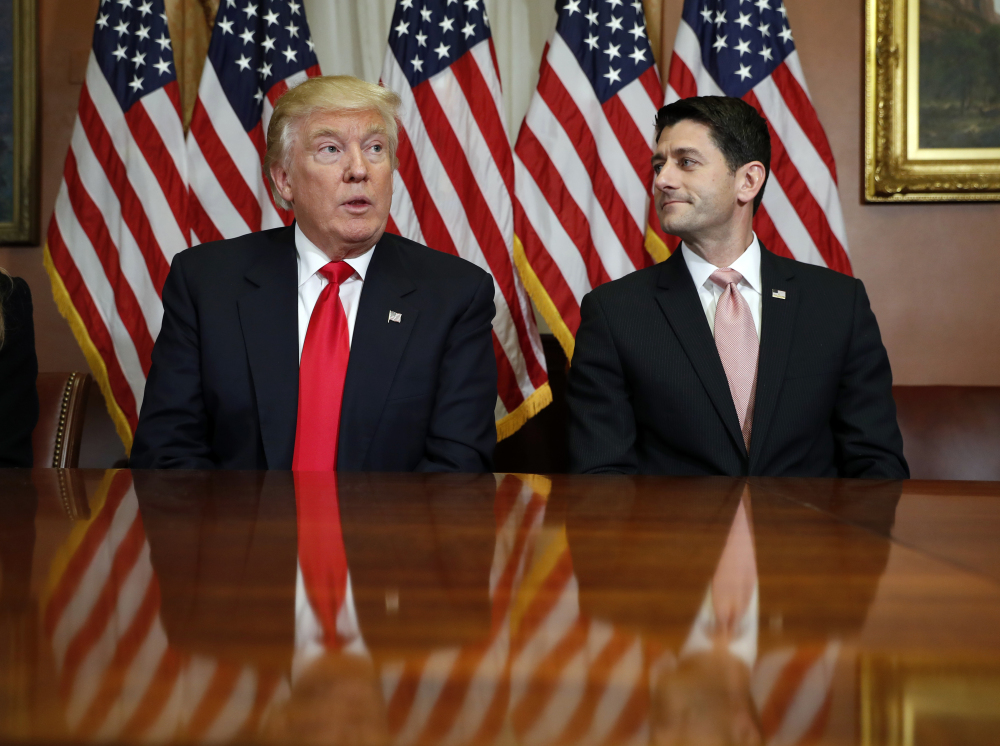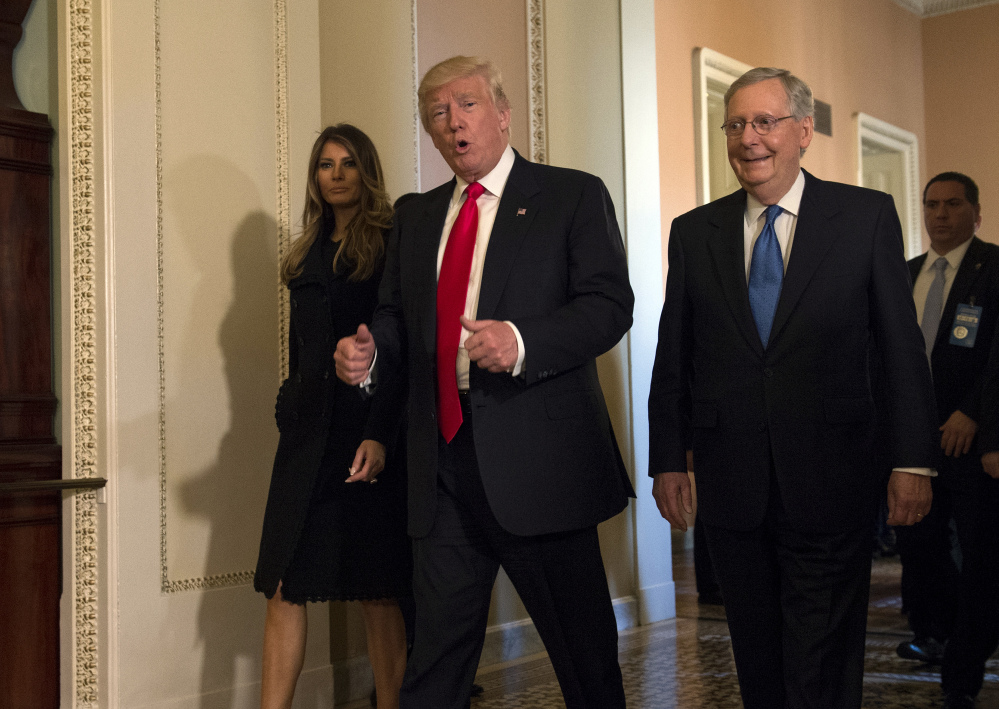WASHINGTON – Washington’s new power trio consists of a bombastic billionaire, a telegenic policy wonk and a taciturn political tactician. How well they can get along will help determine what gets done over the next four years, and whether the new president’s agenda flounders or succeeds.
President-elect Donald Trump, House Speaker Paul Ryan, and Senate Majority Leader Mitch McConnell make up an unlikely alliance, one defined in advance mostly by Trump’s opposition to the Washington establishment that Ryan and McConnell exemplify.
Trump and Ryan clashed throughout the campaign, with Trump taking offense when Ryan initially refused to endorse him and later distanced himself over the audio of Trump talking about groping women.
“Paul Ryan, a man who doesn’t know how to win (including failed run four years ago), must start focusing on the budget, military, vets etc.,” Trump groused over Twitter last month.
But that was then, this is now, as Ryan, the Republican Party’s 2012 vice presidential nominee, said Thursday after meeting with Trump at the Capitol.
“The past is in the past,” Ryan said in an interview on Fox News Channel. “This was an unconventional year, he was an unconventional candidate, but the point is we unified, especially at the right point, at the end. And it worked.”
Indeed, thanks partly to Trump’s coattails, Ryan and McConnell limited expected losses to their majorities and will enter the new administration with control of both chambers of Congress and the White House. For now the glow of victory appears to be soothing past tensions. And Republicans aligned with all three note they have something very important in common: They need each other.
“Ryan needs Trump to accomplish his policy agenda,” said GOP Rep. Tom Cole of Oklahoma, in comments that apply to McConnell as well. “Trump needs Ryan to get things to his desk.”
There are well-known policy disagreements to navigate on issues like trade, immigration, Medicare and Social Security, where Trump’s proposals and campaign rhetoric often flew in the face of Ryan and McConnell’s standard business-friendly Republican approach.
But Trump’s own unfamiliarity with the tedious business of legislating, and unformed policy positions in some cases, may give Ryan and McConnell a unique opportunity to fill in the details. That would be a welcome role for both – McConnell as a deeply experienced legislator and dealmaker, and Ryan as an eager wonk who chaired the Ways and Means Committee before becoming House speaker. Ryan is steeped in details on reforming taxes and reshaping entitlement spending – although Trump has been critical of Ryan’s past budget proposals.
“I don’t think there’s any question that a President Trump will be looking for legislative expertise,” said Josh Holmes, McConnell’s former chief of staff. “Some of that comes from the staff that he hires, and some of that will come from allies on Capitol Hill.”
Moreover, Ryan’s personal political future, including potential presidential ambitions of his own, may depend in part on how effectively he manages the relationship with Trump.
The speaker’s tepid embrace of Trump during the campaign angered some conservatives in his conference, stirring talk that he could face a challenge to his speakership.
But Ryan’s enthusiastic response to Trump’s victory appears to have diminished any appetite for a leadership coup. The wide majority he will continue to enjoy next year – with at least 240 Republicans in the 435-member House, compared to 247 now – also reduces the potential for mischief by a small band of disgruntled conservatives.
“Victory soothes lots of differences,” said GOP Rep. Chris Collins of New York, a top Trump backer. “The mood of us right now is we can’t waste any time with recriminations and finger-pointing. My God, we won!”
Unlike Ryan, McConnell was quick to endorse Trump as soon as he clinched the GOP nomination. McConnell never wavered on that, nor provoked Trump’s ire over Twitter. At 74, McConnell has reached the long-sought pinnacle of his career as Senate majority leader, and unlike Ryan, 46, has no potential higher ambitions to manage.
Just as important, McConnell is known for professional relationships that are all business and have nothing to do with personality. So even though the closed-mouth Kentuckian would seem to have nothing in common with a freewheeling, thrice-married Manhattanite like Trump, allies say that doesn’t matter to McConnell.
That said, both men could face opposition from members of Trump’s inner circle, particularly Stephen Bannon. Bannon was chief executive of the conservative news site Breitbart before assuming a role in Trump’s campaign and is under consideration for a senior spot in Trump’s White House.
Just before Ryan’s primary race in July, with Bannon still at the helm of Breitbart, the site called the speaker a hypocrite for building a “border wall” around his Janesville, Wisconsin, mansion when he refused to support Trump’s southern border wall proposal. Breitbart continued attacking Ryan this fall, publishing a lengthy post titled, “He’s with her: Inside Paul Ryan’s months-long campaign to elect Hillary Clinton president.”
Breitbart has also slammed McConnell, criticizing him over occasions where he bestowed lukewarm praise on Clinton and criticized Trump’s undisciplined campaigning.
What position Trump gives Bannon versus Republican National Committee Chairman Reince Priebus, a Trump confidante and close Ryan ally, may be a signal as to how the incoming president plans to collaborate, or not, with the congressional leadership.
Associated Press writers Julie Bykowicz and Alan Fram contributed to this report.
Send questions/comments to the editors.



